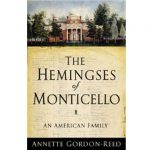 It turns out that the stories about Thomas Jefferson I learned while growing up don’t exactly tell the whole story. Funny how that happens with “history” sometimes… lots of times.
It turns out that the stories about Thomas Jefferson I learned while growing up don’t exactly tell the whole story. Funny how that happens with “history” sometimes… lots of times.
Thomas Jefferson wrote the Declaration of Independence, was the third president of the United States, founded the University of Virginia, designed and built Monticello, and died the same day John Adams died; fifty years to the day after the founding of our nation on July 4, 1826.
And then there’s all rest; the stuff that isn’t so noble. The whispered parts of Jefferson’s life that I didn’t learn so much in school were hidden for a reason. Some of it is quite unsavory; horrible, frankly. These parts bring him down off the marble pedestal and allow us to see him as more, well, human. And, too often, inhumane.
For the past five years I’ve participated in Coming to the Table which is a group of people connected to the history of enslavement that are interested in healing from its ongoing damage. Some of the people who started Coming to the Table are descendants of Thomas Jefferson–white and black descendants. One is Susan Hutchison, who recently contributed a guest post to this blog. “Bridging the Gap” is a story of Susan’s meeting with descendants of people her ancestors once owned. As you can imagine, my interest in Jefferson has become more personal and it feels appropriate to follow Susan’s post with another one focused on people to–black and white–whom she is related.
I read Sally Hemings by Barbara Chase-Riboud a few years back. I found it compelling and eye-opening. The author was castigated by some for concluding that Jefferson and Hemings had a decades-long intimate relationship that resulted in the birth of several children. Later DNA evidence has led most scholars to agree with Chase-Riboud’s conclusion.
Two years ago The Hemingses of Monticello was published. It won both the National Book Award and the Pulitzer Prize. Author Annette Gordon-Reed is a Professor of Law and History at Harvard. Her book is a detailed account of three generations of the Hemings family and their relationship with Jefferson and his family.
As much as I was impressed with Gordon-Reed’s scholarship and all the fascinating details of the lives of the members of the Hemings family and their relationship to our third President, it was something other than the stories of these lives that had the biggest impact on me. This book, though it is certainly the story of one famous, extended family, is really a powerful symbol for the whole of the American experience. The complexity of relationships, the love, violence, power, horror, political intrigue, and even the mundane details of everyday life led me to ponder repeatedly other early Americans, rich and poor, black and white, famous and obscure; most of whom we will never know anything about.
Important books like this one shine a light in the sometimes-dark corners of American history. They help all of us understand more clearly the foundation upon which our nation was built. Perhaps more people will be encouraged to seek additional knowledge about how this centuries-old history has led to so many of the challenges we face today around issues of race, gender, class, religion, and power.
I’m blessed by my relationships with people in the Coming to the Table community–black and white descendants of Thomas Jefferson, and others, like me, from more obscure ancestors–people that seek to understand and heal from historic harms that continue to impact all of us today. Books like The Hemingses of Monticello are important resources for this journey. It is also a great read.

Hi Tom. My name is Angelie (Angie) Terry. I read your blog on THATS WHAT TOM HAS TO SAY ABOUT THAT on the book THE HEMINGSES OF MONTECELLO. Loved it. Very interesting. I live in McKinney Texas. I am 50 years old. But when I was a child it was a very racist town. Not so now. I like to go to the library as often as I can and they have a shelf of withdrawn books as all libraries do and I was fortunate enough to come across this book and keep it for my library. At the risk of sounding ignorant. I didn't even know about Jefferson and his slave involvments to that extent. It is an excellent book on our history. I thought I had picked up a love story of sorts not even realizing the prize I had found.
Glad you found the book, Angie. It is quite the prize! There is much to learn about our nation's history that has been hidden from us. Best wishes on your continuing journey, and thanks for writing!